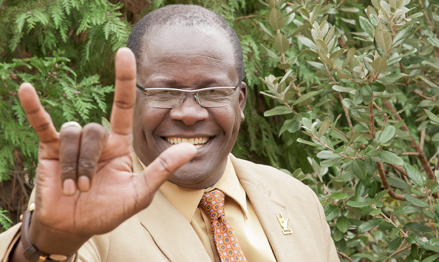Latest News Archive
Please select Category, Year, and then Month to display items
10 March 2022
|
Story Anthony Mthembu
|
Photo Unsplash
 The No Student Hungry team gearing up to start distributing food parcels to the selected students.
The No Student Hungry team gearing up to start distributing food parcels to the selected students.
The UFS is one of the many institutions of higher learning where food insecurity is an active issue. However, the
No Student Hungry Programme is one of the initiatives launched at the university to assist in fighting food insecurity at the institution.
The purpose of the programme
Since its inception in 2011, the initiative has assisted many students in acquiring a healthy meal. Additionally, the Food Environment Office also hands out food packages, so that students can continue to achieve academically. “We are trying to develop a healthy environment for students and make it easier for them to have a nice and healthy meal,” stated Annelize Visagie, who heads the Food Environment Office at the UFS. The Food Environment programme is spread out on all three campuses, each with its own facilitators. Furthermore, the programme mainly caters for students who are not funded by the National Student Financial Aid Scheme (NSFAS) but who are excelling academically. The abovementioned students apply for assistance online, and a list is then drawn up of students who receive assistance for the year.
Alternative solutions to keep the initiative running
On the Bloemfontein Campus, the No Student Hungry Programme will be catering for 200 students in the 2022 academic year, assisting them with a daily nutritious meal. Additional food parcels are also handed out to provide further assistance. “We give food parcels to the students on the list every Tuesday and Thursday at the Thakaneng Bridge,” Visagie highlighted. However, she argues that catering for the student population through this programme can be a challenge, as the demand for assistance is growing rapidly and the ability to assist is limited. The programme relies on partnerships and sponsors to assist the student body. In fact, the coordinators of the programme currently have a memorandum of understanding with Tiger Brands according to which they deliver around 100 food parcels for distribution.
In addition, the coordinators have put in place alternative measures to ensure that they can provide more food to students. “The
Kovsie Act Office, in partnership with the
Department of Sustainable Food Systems and Development, has started a food garden where healthy and nutritious produce are grown, in order to add value to the distribution,” she indicated. Although the programme can only assist to a point, students who are in desperate need of assistance are never turned away. In fact, the
Social Support Unit at Thakaneng Bridge usually assists students with food vouchers for a maximum of four days.
A commitment to teaching healthy eating habits
The programme is not only committed to curbing food insecurity, but also to ensuring that students have a healthy and balanced diet. As such, a booklet is being issued by the
Department of Nutrition and Dietetics in collaboration with the Department of Sustainable Food Systems and Development, which contains ways in which students can make a healthy meal using some of the ingredients offered in the food parcels.
“We want to teach students how to eat healthy in the cheapest way, because they don’t have a lot of money to buy expensive food products,” Visagie argued.
National accolade for Dr Philemon Akach
2013-10-21
|
 |
|
Dr Philemon Akach
Photo: Sonia Small
21 October 2013 |
Excellence in Teaching and Learning is highly regarded at the University of the Free State, with our academics recognised on national and international platform.
Earning yet another accolade for the university, Dr Philemon Akach, Head of the Department of South African Sign Language, has been awarded a National Excellence in Teaching and Learning Award. The award by the Higher Education Learning and Teaching Association of Southern Africa (HELTASA) and Council on Higher Education (CHE), recognised Dr Akach as a “leader in the field of teaching and learning – with impact beyond the classroom and the institution.” Recognising his pioneering work within deaf education, HELTASA and CHE commend Dr Akach as an “inspirational practitioner who recognises the inclusion of the marginalised in education.”
Dr Akach is one of five recipients, selected out of a total of 22 candidates from across South Africa that will receive the award. The other winners are from the University of Cape Town, Stellenbosch University, University of KwaZulu-Natal and the University of Pretoria. The five winners will receive the awards at a gala dinner at the annual HELTASA conference, which takes place from 26 to 29 November 2013.
Dr Akach, who will retire at the end of 2014, says the national recognition is the cherry on top as he prepares to return to his home country. Kenya. “How good can it be?” “This is my life calling,” he said about the 37 years he worked within deaf education.
The academic also received an Alumni Award for Outstanding Service at the recent Kovsie Alumni Awards.
Pioneering work by Dr Akach:
- With Dr Akach steering the process, the UFS became the first university on the continent to offer Sign Language as an academic course in 1999.
- Dr Akach was part of a nine-member task team that handed over the South African Sign Language (SASL) curriculum to the Minister of Basic Education, Angie Motshekga. A member of the ministerial task team since 2009, he helped to coordinate the development of the curriculum that will soon be offered as a school subject to Grade 0–12 learners in all 42 schools for the deaf in South Africa.